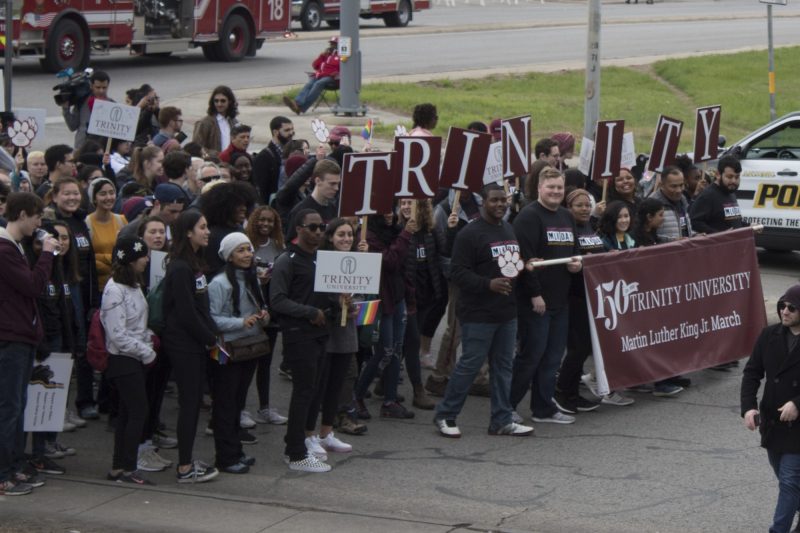Photo by Matthew Claybrook
Trinity students, staff and faculty took to the streets on Monday in honor of the annual City of San Antonio Martin Luther King, Jr. March. The march occurs every January to commemorate the legacy of Martin Luther King, Jr., who fought for racial, economic and societal justice until his assassination in 1968.
The original march that King led from Selma to Montgomery, Alabama was part of a series of civil rights protests against racist policies and the widespread disenfranchisement of black Americans. Primarily due to this march and King’s additional activism, the Voting Rights Act — which made poll taxes and other difficulties experienced by black voters illegal — was passed in 1965.
The first MLK March in San Antonio was organized in 1968 by Raymond “R.A” Callies, Sr., a San Antonio teacher and pastor who wanted to raise awareness for the need for basic infrastructure on San Antonio’s historically black East Side. On Jan. 19, 1987, the Commission and the City of San Antonio officially endorsed the march. In the 50 years following, San Antonio’s MLK, Jr. March has become the largest in the nation.
This was the first time that Alli Roman, director of the Office for Diversity and Inclusion, had an active role helping to take people to the march and negotiate the planning process with the city.
“I think it’s really awesome to be able to remember the legacy of MLK and the importance of his work,” Roman said. “There’s still work that needs to be done, but I think having those moments to kind of reflect and to be in community is very important.”
Roman hopes that students will hold onto MLK’s spirit of activism now after the march is over.
“I hope that students will understand that it is important for us to celebrate and remember MLK, Jr.’s legacy, but also not to take that celebration as the end point,” Roman said. “We still have to work together to try to undo some of the things that are happening and [to] strive towards social justice.”
Khaniya Russell, senior and president of Black Student Union, helped to coordinate groups of students and inform them of event logistics. Russell is a member of Trinity’s MLK Committee, which serves to educate students during Trinity’s annual MLK-focused Dream Week.
“I think [the March] is a really important opportunity for us to celebrate unity and diversity among the larger San Antonio community. I think those are things that our administration and our students really value and so it’s like a sense of solidarity to be able to celebrate that among such a large crowd,” Russell said.
Deneese Jones, vice president for Academic Affairs, also attended the march. Jones received an award late Monday night from Henry Cisneros and Aaronetta Pierce at an appreciation reception for San Antonians who have advanced King’s dream of racial equality and acceptance.
“It’s very humbling to me, as someone who actually met Dr. King when I was a little girl … to be in line with someone who I consider such a great leader is quite an honor,” Jones said. “As a child, I just knew he was someone important, and that made me a little bit intimidated, but he was very gracious.”
Trinity recently accepted its most diverse class of students, with 40 percent of the incoming cohort of first-years coming from historically underrepresented racial groups. On a national scale, the demographics of college students are shifting to reflect a more racially diverse country.
Jones spoke about what King’s message means for Trinity in light of these demographic shifts.
“[King] talks about not being judged by the color of your skin but the content of your character; some people interpret that [statement] as being ‘color-blind,’ but the real intent of that was an appreciation of our differences and capitalizing on those,” Jones said. “For this campus, I think as we go through these demographic shifts, we need to have an appreciation of our differences.”
Nanette Le Coat, professor of modern languages and literatures, has been attending the march for 30 years.
“I’ve seen [Trinity’s participation] grow, and I’m thrilled. I think this is a really great thing that Trinity does to bring students together for a really important event. Every year, there’s another bus [to go to the March],” Le Coat said. “Our student groups are involved, and I think the administration is fully behind this effort. It really brings us together as a community.”
Emmanuella Odugawa is participating in the march for the last time as a senior as well as an MLK Committee member.
“This is my third time being in the walk, so I’m really excited to take part in it for the last time. I’ve always enjoyed the march because it’s a really great time to connect with the Trinity community, and also get more insight into what’s happening around San Antonio with civil rights,” Odugawa said.
For other students, like first-year Nadine Mong’are, this was their first time attending the march in San Antonio.
“I’m from Delaware, and we don’t have anything this big, so it’s nice to see a really big community of people getting together and walking for something that we believe in,” Mong’are said.
Students who are interested in learning more about Martin Luther King, Jr.’s legacy can read books such as “The Autobiography of Martin Luther King, Jr.” edited by Clayborne Carson, “My Life with Martin Luther King, Jr.” by Coretta Scott King, or “From Civil Rights to Human Rights: Martin Luther King, Jr., and the Struggle for Economic Justice” by Thomas F. Jackson, all of which are available at the Coates Library.







